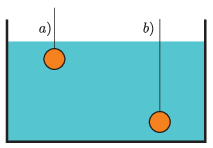 Problem P. 5439. (November 2022)
Problem P. 5439. (November 2022)
P. 5439. A spherical copper ball at \(\displaystyle 20\;{}^\circ\textrm{C}\) hanging on a thin insulator string is immersed in a large amount of water at \(\displaystyle 80\;{}^\circ\textrm{C}\). After a time of \(\displaystyle t_1\) the copper ball warms up to \(\displaystyle 50\;{}^\circ\textrm{C}\). Later the experiment is repeated in such a way that the initial temperature of water is \(\displaystyle 20\;{}^\circ\textrm{C}\), while the ball is at \(\displaystyle 80\;{}^\circ\textrm{C}\). In this way the copper ball cools down to \(\displaystyle 50\;{}^\circ\textrm{C}\) during a time of \(\displaystyle t_2\). What is shorter, \(\displaystyle t_1\) or \(\displaystyle t_2\), if the ball

\(\displaystyle a)\) is just immersed into the water, or
\(\displaystyle b)\) is submerged almost to the bottom of the container?
(4 pont)
Deadline expired on December 15, 2022.
Sorry, the solution is available only in Hungarian. Google translation
Megoldás. \(\displaystyle a)\) A vízfelszín közelében a hideg rézgolyó lehűti a körülötte lévő melegebb vizet. Ez a víz sűrűbb, mint a víz többi része, tehát lesüllyed, kialakul egy konvektív áramlás, ami felgyorsítja a hőcserét. Ha a környező víz hidegebb, mint a rézgolyó, a víz fokozatosan melegszik, sűrűsége lecsökken, de ez – mivel a golyó a vízfelszín közelében van – nem indít el konvektív áramlást, a hőcsere lassúbb lesz. Ennek megfelelően \(\displaystyle t_2>t_1\).
\(\displaystyle b)\) Az edény alján a melegebb rézgömb felmelegíti a környező vizet, annak sűrűsége a golyó közelében lecsökken. A kisebb sűrűségű víz felemelkedik, helyébe hidegebb víz áramlik. A hőcsere a konvektív áramlás miatt gyorsabb lesz, mintha a hidegebb gömböt venné körül melegebb folyadék. Ennek megfelelően \(\displaystyle t_2<t_1\).
Statistics:
18 students sent a solution. 4 points: Bocor Gergely, Csonka Illés, Dancsák Dénes, Elekes Dorottya, Fajszi Karsa, Flóring Balázs, Klement Tamás, Molnár Zétény, Nemeskéri Dániel, Szabó Imre Bence, Szatmári András Gábor, Szegedi Ágoston. 2 points: 1 student. 1 point: 1 student. 0 point: 1 student. Unfair, not evaluated: 1 solutions.
Problems in Physics of KöMaL, November 2022
